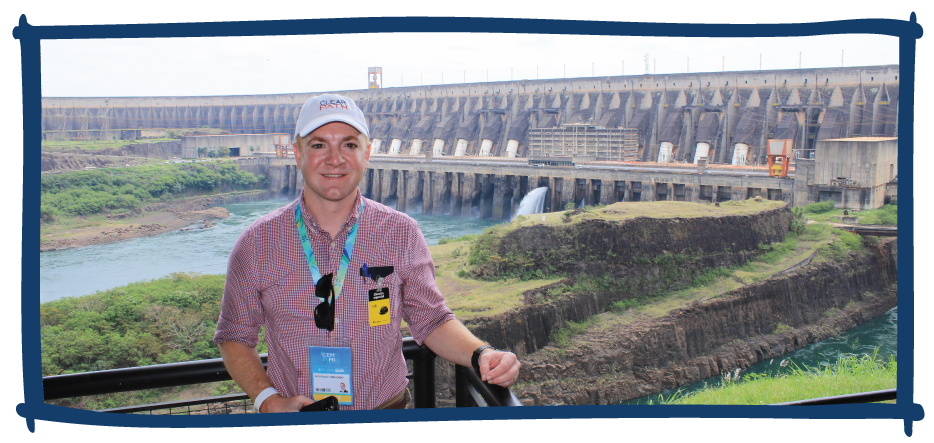Posted on October 10, 2024 by Nick Lombardo and Justin Williams
Stepping outside of the Clean Energy Ministerial and Mission Innovation (CEM/MI) meetings in advance of the G20 energy ministers’ summit in Foz do Iguaçu, Brazil, the faint smell of smoke and visible haze from Amazonian wildfires was a stark reminder of the fragile balance between economic growth and the natural environment. Locals explained the fires were both from natural causes – given recent droughts – but some set intentionally by farmers or developers to clear the land. ClearPath often emphasizes that the U.S. produces energy, goods, and agricultural products in a more environmentally responsible manner than many other nations, and my experience in Brazil was an impactful reminder about the need for America’s global clean energy leadership.

The CEM/MI gathering also highlighted the need for U.S. engagement abroad, in many ways. Perhaps the biggest was the context of Brazil’s current G20 presidency and upcoming COP30 host in 2025. Strengthening U.S. ties with Brazil and like-minded partners is essential – not only to advance clean energy but also to prevent China and Russia from dominating key markets and supply chains.
Brazil’s role as a growing energy powerhouse positions it as a crucial U.S. partner in regional and global discussions about energy, economics, and environmental responsibility. The gatherings in Brazil – bringing together leading thinkers and stakeholders from government, industry, and NGOs – were a prime opportunity to engage with all who share our commitment to a cleaner, more secure energy future. Brazil’s energy infrastructure – such as the Itaipu Binacional Dam, designed with American and Italian engineering that powers approximately 10% of Brazil’s energy needs and an astonishing 80% of Paraguay’s—demonstrates that large-scale projects are achievable with the right investment and leadership.

Nick Lombardo, Senior Program Director – International Policy
ClearPath’s participation at CEM/MI was focused on advocating for an all-of-the-above energy strategy that includes advanced nuclear, carbon capture utilization and storage (CCUS), and hydrogen – technologies that ensure economic growth and energy security while also reducing emissions.
Some of the key issues that came up at the conversations in Brazil were the urgent need to modernize U.S. trade and development finance mechanisms, particularly through the reauthorizations of the U.S. Development Finance Corporation (DFC) and the Export-Import Bank (EXIM). These institutions are critical tools for financing clean energy projects worldwide, and their respective upcoming reauthorizations present crucial opportunities to fine-tune these agencies to effectively finance energy expansion projects, especially in countries where clean energy infrastructure is essential for economic growth and energy independence.
In Brazil, the DFC and EXIM can play a transformative role by:
Leveraging Multinational Partnerships: With Brazil hosting COP30, U.S. agencies can foster partnerships with Brazilian companies and government entities to enhance local expertise and build capacity in energy technologies. These partnerships align with Brazil’s goals and help create a more stable environment for U.S. investments, creating significant value for the American economy.
As the U.S. engages with Brazil and other key partners, it is essential to recognize the growing competition from China and Russia in the global energy market. These countries are actively seeking to expand their influence through aggressive financing of energy projects, often without the same environmental and ethical considerations that guide U.S. investments.
By strengthening DFC and EXIM, the U.S. can position itself as a reliable partner in Brazil’s energy expansion, countering the narrative that often favors adversarial nations. ClearPath advocates for a focused approach that not only promotes clean energy solutions but also reinforces the economic and strategic ties that underpin U.S. interests in the region.
The U.S. has made world-class advancements in energy, manufacturing and agriculture production under some of the strongest environmental standards globally. As we aim to boost domestic production, more of our practices and products could be adopted and exported to the rest of the world.
Looking ahead to COP29 and Brazil’s hosting of COP30, the U.S. has a unique opportunity to build on the momentum from CEM/MI. By working with Brazil and other key partners, and ensuring our financial institutions are prepared to support the next wave of energy expansion projects, we can secure a cleaner, more prosperous future where American leadership is central.
